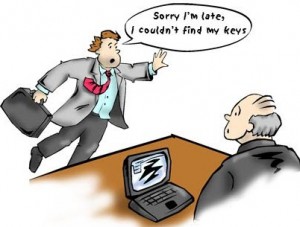Preparing Tips for a Project Management Interview
So you’ve got an interview for a new job? Congratulations! Getting an interview is the next step to getting a job, after sending off your resumé or application form. An interview means that on paper at least the company thinks that you could do the job and now wants to meet you. Don’t blow it! Here are some tips for preparing for the all important interview stage for a project management job.
Research the Company

Don’t turn up at a healthcare company thinking it manufactures aircraft parts. In the age of the internet, there really is no excuse for not knowing about the company before you go and meet some of the managers there. Find out what it does, who its customers are and if you can the vision and values. Many companies will have all this stuff on their corporate website.
Do an online search for the company name and see what comes up. Are they active on social media sites? Do any of their employees have a blog? This can be a great way to get a feel for what working at the company is really like.
Many companies will also have short profiles of their senior team members online. Scroll through these – look at the photos and the biographies of the key executives. Have they had similar career paths to you? Even if you are not interviewing for a job at this level and will not meet them as part of the interview process, it is interesting to know who gets promoted to the top jobs and how they got there.
You can also do some research about the person who will be interviewing you. Make sure that you know their job title, department and how they fit into the organization overall. If you can’t find out this information, add it to your list of questions to ask when you get there – more on that below.
Research the Job
Not all project management jobs are the same. Is this a project coordinator role or a program manager role? Is it based in a Project Management Office (PMO) or does it report in to a business unit? Ask your interviewer to send you a copy of the job description and role profile in advance so you can see exactly what you are being interviewed for.
Another thing to check is the salary. While it’s often considered poor form to talk about money in a first interview, you do want to know what range the pay will be in. There is no point going for an interview for a job only to find that you love the company and the job but couldn’t possibly take that much of a cut in salary to do the work. Don’t waste everyone’s time by interviewing for posts that you wouldn’t accept.
Prepare your Questions
 There should be time at the end of the interview to ask questions. Think of something to say at this point – there must be something you want to know. If there isn’t, you probably aren’t very interested in the company or the job! Write your questions down if you are worried that you will forget them. There is no shame in pulling out a notebook to read out your questions as this shows that you are prepared. Remember, choosing a new job is a big decision that can affect several areas of your life so this is also your opportunity to find out if this company is a good fit for you.
There should be time at the end of the interview to ask questions. Think of something to say at this point – there must be something you want to know. If there isn’t, you probably aren’t very interested in the company or the job! Write your questions down if you are worried that you will forget them. There is no shame in pulling out a notebook to read out your questions as this shows that you are prepared. Remember, choosing a new job is a big decision that can affect several areas of your life so this is also your opportunity to find out if this company is a good fit for you.
You could ask about why the vacancy has arisen, how the interviewer feels project management contributes to the company overall, when the PMO was set up or what the interviewer’s own career path was to the project management position that they have now. Steer clear of questions about pension contributions, paid holidays and how long you have to work before you qualify for maternity or paternity leave. These are benefits and terms that you can negotiate later if you get the job.
If you really can’t think of anything to ask, stick to questions about the recruitment process. Ask about when they will be making a decision, if there will be another round of interviews and how you will hear from them.
Prepare your Answers
Once you know about the type of job you are going for you can give some thought to what sort of questions they will ask you. Make sure your resumé is up to date and that you can provide examples of the work you did in your recent positions. Have a response ready for the inevitable question about why you are job hunting, and also plan what to say if they ask you what you can bring to the company or why you want to work for them.
Most interviewers will let you know in advance if there is going to be any kind of test or presentation, so read your interview letter carefully. You can prepare for most tests unless they are designed to show personality traits. Any project management related tests can be prepared for – read through the relevant standards or manuals in advance to remind yourself of the terms and language that might be tested. Even if you have worked in project management for some time it is still worth doing this to brush up your skills for interview day.
You can also prepare for a presentation, even if you do not know the topic in advance. Think about how best to structure it, and maybe ask a friend to set you a practice topic so that you can have a go at preparing a short presentation in the time frame and delivering it to an audience.
Know Where You are Going
 It doesn’t look good to show up late because you got lost. That doesn’t give a good impression about how organized and professional you are. Make sure you know where you are going, and if you don’t know, ask the interviewer or HR department to send you a map and directions. Plan out your journey, and a second travel option or route in case you hit a problem on the way. As a back up, make sure that you have the contact details for the interviewer and the main reception desk so if the worst does happen and you are running late at least you can call and let them know that you aren’t going to make the scheduled time.
It doesn’t look good to show up late because you got lost. That doesn’t give a good impression about how organized and professional you are. Make sure you know where you are going, and if you don’t know, ask the interviewer or HR department to send you a map and directions. Plan out your journey, and a second travel option or route in case you hit a problem on the way. As a back up, make sure that you have the contact details for the interviewer and the main reception desk so if the worst does happen and you are running late at least you can call and let them know that you aren’t going to make the scheduled time.
There is no problem with getting there early (although don’t turn up at reception more than 15 minutes early). You can check your notes, get a coffee, or just sit in the car and wait until it is time to go into the building.
Preparing for any interview can be daunting, but somehow a project management interview tends to be a little bit worse. After all, the interviewer is expecting you to demonstrate that you can be calm under pressure and very organized, and that is hard to do in an interview situation. These tips will help you feel more prepared and in turn that should help you give the best first impression that you can on the day.